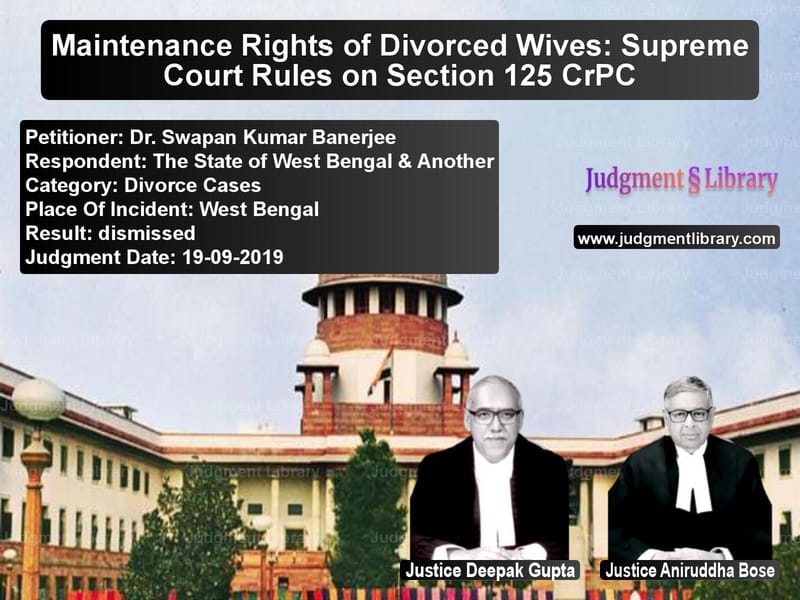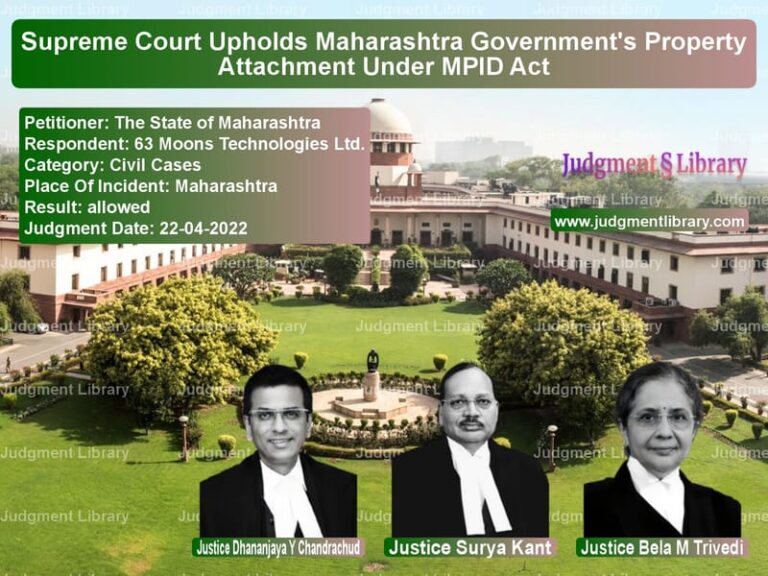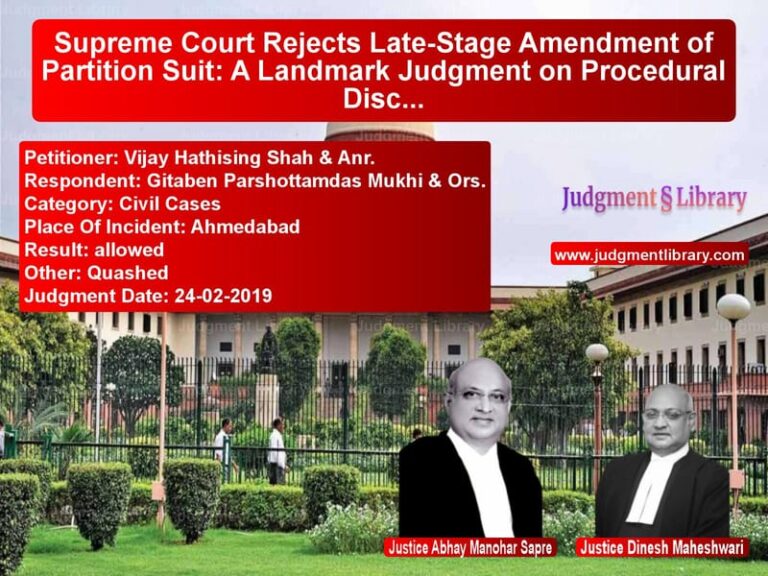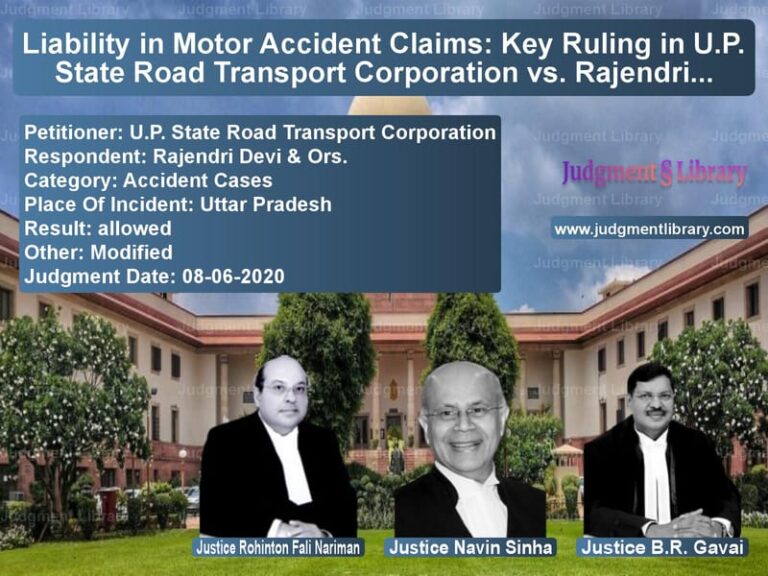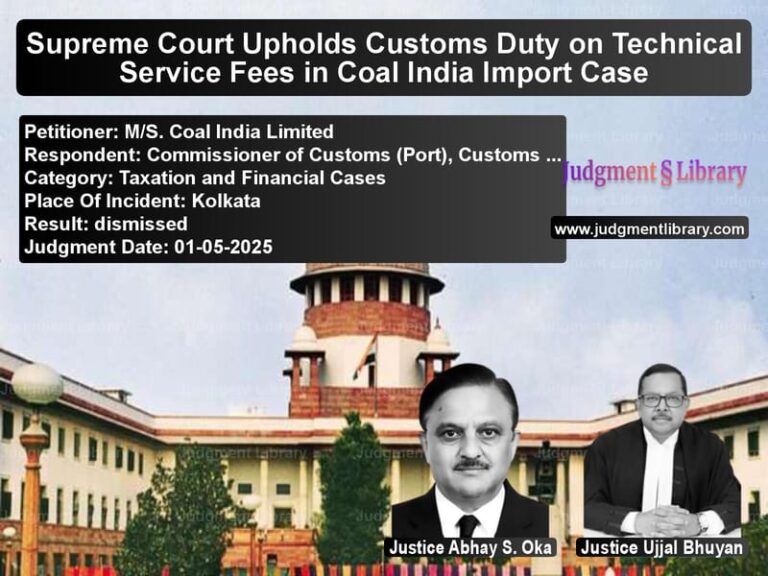Maintenance Rights of Divorced Wives: Supreme Court Rules on Section 125 CrPC
The Supreme Court of India, in the case of Dr. Swapan Kumar Banerjee vs. The State of West Bengal & Another, addressed the crucial issue of whether a divorced wife, who was granted divorce on the ground of desertion, is entitled to maintenance under Section 125 of the Code of Criminal Procedure (CrPC), 1973. The ruling affirms the right of divorced wives to claim maintenance irrespective of the grounds for divorce.
Background of the Case
The appellant, Dr. Swapan Kumar Banerjee, had obtained a divorce from his wife in 2000 on the ground of desertion. Following the divorce, the respondent (wife) filed a petition for maintenance under Section 125 CrPC. The trial court awarded her a monthly maintenance of Rs. 10,000, which was upheld by the High Court. The husband challenged this order before the Supreme Court, arguing that since the wife was divorced on the ground of desertion, she was not entitled to maintenance under Section 125(4) CrPC.
Key Legal Issues Considered
- Whether a divorced wife, who was granted divorce on the ground of desertion, is entitled to maintenance under Section 125 CrPC.
- Whether Section 125(4) CrPC, which disqualifies a wife from maintenance if she refuses to live with her husband without sufficient reason, applies to a divorced woman.
- Whether financial capability of the wife affects her right to claim maintenance.
Arguments by the Petitioner (Dr. Swapan Kumar Banerjee)
The petitioner argued:
- Since the respondent was divorced on the ground of desertion, she was disqualified from claiming maintenance under Section 125(4) CrPC.
- The explanation to Section 125, which includes a divorced woman in the definition of “wife,” should be read in conjunction with Section 125(4), which disallows maintenance to a woman who deserted her husband.
- The respondent was a qualified architect from Jadavpur University and was capable of maintaining herself.
- The wife did not claim maintenance during the divorce proceedings, indicating she was not financially dependent.
Arguments by the Respondent (Wife)
The respondent countered:
- The explanation to Section 125 explicitly includes divorced women, ensuring that they are entitled to maintenance.
- Section 125(4) applies only to subsisting marriages and does not affect the rights of a divorced woman.
- The mere fact that the wife did not claim maintenance earlier does not prevent her from seeking it later.
- The petitioner failed to provide evidence of the wife’s independent income.
Supreme Court’s Observations
The Supreme Court analyzed the legislative intent of Section 125 CrPC and made the following key observations:
- Section 125 aims to prevent vagrancy and destitution by ensuring financial support for wives, children, and parents.
- The explanation to Section 125(1) clarifies that “wife” includes a woman who has been divorced by, or has obtained a divorce from, her husband and has not remarried.
- Section 125(4) does not apply to divorced women since the question of “refusing to live with her husband” becomes irrelevant after divorce.
- “The husband cannot urge that he can divorce his wife on the ground that she has deserted him and then deny maintenance which should otherwise be payable to her.”
- The wife’s right to maintenance continues post-divorce unless she remarries or is proven to have sufficient income.
Final Judgment
The Supreme Court dismissed the appeal and upheld the High Court’s decision, ruling that:
“The deeming fiction of a divorced wife being treated as a wife can only be read for the limited purpose of granting maintenance, and the deeming fiction cannot be stretched to the illogical extent that the divorced wife is under a compulsion to live with the ex-husband.”
The husband was ordered to continue paying Rs. 10,000 per month as maintenance.
Implications of the Judgment
- For Divorced Women: The ruling reaffirms their right to maintenance, ensuring financial protection even if divorce was granted on the ground of desertion.
- For Husbands: They cannot evade maintenance obligations by claiming that divorce was granted due to the wife’s desertion.
- For Legal Practitioners: The decision provides clarity on the interpretation of Section 125 CrPC, distinguishing between a wife’s obligation to live with her husband and a divorced woman’s right to maintenance.
- For Judicial Precedent: The ruling strengthens previous Supreme Court decisions affirming the rights of divorced women under Section 125 CrPC.
Conclusion
The Supreme Court’s ruling ensures that divorced women are not left financially vulnerable, even if they were granted divorce on the ground of desertion. The judgment upholds the spirit of Section 125 CrPC, reinforcing the principle that maintenance is a fundamental right aimed at preventing destitution. This decision serves as a crucial precedent in matrimonial law, securing financial justice for divorced women across India.
Petitioner Name: Dr. Swapan Kumar Banerjee.Respondent Name: The State of West Bengal & Another.Judgment By: Justice Deepak Gupta, Justice Aniruddha Bose.Place Of Incident: West Bengal.Judgment Date: 19-09-2019.
Don’t miss out on the full details! Download the complete judgment in PDF format below and gain valuable insights instantly!
Download Judgment: Dr. Swapan Kumar Ban vs The State of West Be Supreme Court of India Judgment Dated 19-09-2019.pdf
Direct Downlaod Judgment: Direct downlaod this Judgment
See all petitions in Alimony and Maintenance
See all petitions in Domestic Violence
See all petitions in Mutual Consent Divorce
See all petitions in Judgment by Deepak Gupta
See all petitions in Judgment by Aniruddha Bose
See all petitions in dismissed
See all petitions in supreme court of India judgments September 2019
See all petitions in 2019 judgments
See all posts in Divorce Cases Category
See all allowed petitions in Divorce Cases Category
See all Dismissed petitions in Divorce Cases Category
See all partially allowed petitions in Divorce Cases Category

